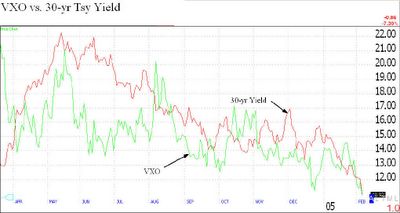
Posted by Hello
Normally treasury yields and equity volatilities are inversely correllated and you can even see the inverse correlation happening over short periods during the last year while the trend in both has been lower. I expect that positive relationship between volatilities and yields may last for a while as they are both related to excessive investment in U.S. assets.
The financial times explained the bullish move in bonds (U.K. gilts and global rates) like this:
The lack of good investment alternatives is also creating an excess of money fighting for short term gains in financial markets pressing volitilities towards historic lows. I would guess that trend did not end on Friday but that it may end within the next few months. It is a good explanation of what is going on in the short run but I doubt this situation can persist.Yet there may be a more elementary explanation for low long-term real interest rates. Just as the price of bananas balances the supply and demand for this fruit, so the rate of interest balances the supply of savings against the demand for funds to invest. Monetary policy is important mainly at the short end and for its effect on inflation. But the important influence at the longer end is the balance of world savings and investment.
Thus, I come to the simple hypothesis that falling real interest rates reflect a growing shortage of attractive investment projects to absorb savings. The world is indeed supposed to be short of capital and we are told that we do not save enough. But what matters in this context is not the developing world projects that might be desirable but the number of projects world-wide that promise a commercial risk-adjusted return.
The reason why so much of the world's savings has gone to the US is surely just because of the dearth of such investment outlets elsewhere. In the 1930s, Lord Keynes feared that the rate of interest could not fall low enough to balance savings and investment at a reasonable level of employment. But up to now, world capital markets have worked well and interest rates have fallen enough to balance savings and investment without generating a depression.
I don't believe there is a shortage of available infrastructure investment that could be made in the developing world. I tend to see policy moves like the G7 decision to forgive developing country debt as indications that the G7 governments "get it" and are forcing liquidity out to the perifery where it can be put to better use.
No comments:
Post a Comment